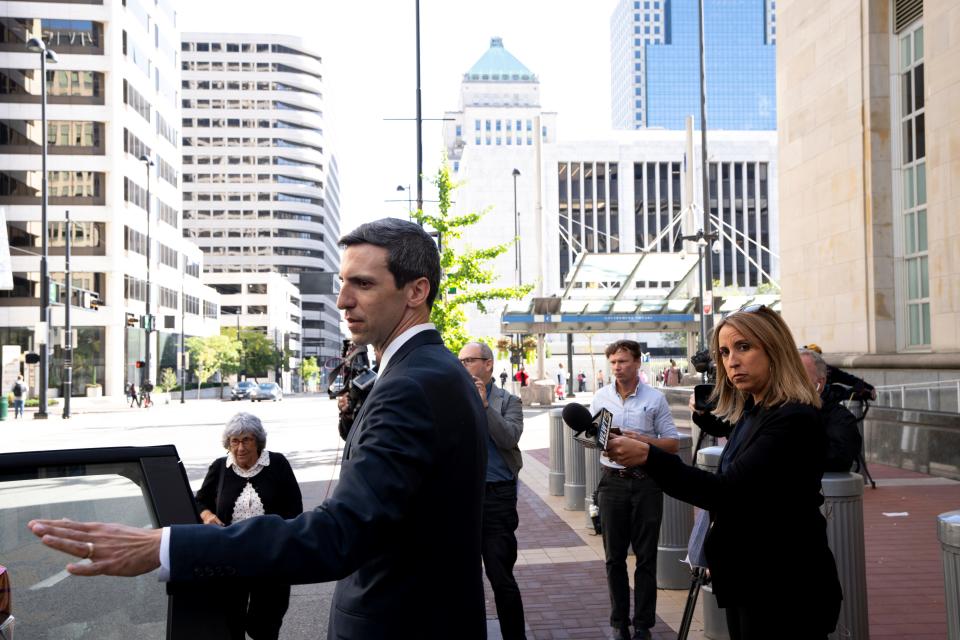PG Sittenfeld appeal: What's criminal when it comes to campaign contributions?
- Oops!Something went wrong.Please try again later.
- Oops!Something went wrong.Please try again later.
An attorney for P.G. Sittenfeld asked a federal appeals court on Thursday to overturn his convictions for bribery and attempted extortion, saying he didn't commit a crime.
If the convictions are allowed to stand, attorney Yaakov Roth told a three-judge panel during oral arguments, it could expose every elected official in the country to prosecution for accepting campaign contributions.
Sittenfeld, a former Cincinnati city councilman, was found guilty of the charges in 2022 and sentenced last year to 16 months in prison. He's five months into that sentence, now. But he is appealing his convictions, and the 6th U.S. Circuit Court of Appeals heard oral arguments Thursday.
The roughly 40-minute hearing took place in a courtroom packed with Sittenfeld supporters as well as attorneys interested in the outcome of the appeal, which partly centers on what is corrupt when it comes to a politician accepting campaign contributions.

Sittenfeld himself was not in the courtroom.
Roth began his argument by pointing to amicus briefs filed by 16 former federal public corruption prosecutors as well as a bipartisan group of former attorneys general and federal judges.
All of them, Roth said, are trying "to tell this court that something has gone wrong."
Judges question both sides
The judges − John Bush, John Nalbandian and Eric Murphy − continuously asked questions of both sides throughout.
Many questions focused on whether Sittenfeld's actions were sufficient to be considered crimes. The judges also asked about topics that were raised repeatedly throughout the trial and in post-trial court filings.
Some questions centered on whether there was clear and unambiguous evidence of an exchange of money for official action − a quid pro quo.
At one point, Nalbandian pointed out that Sittenfeld had promised to "deliver the votes" and get a "veto-proof majority" of City Council to support a development project, in exchange for a $20,000 donation to his political action committee.
Why couldn't the jury conclude that was evidence of corruption? he asked Roth.
Roth responded that prosecutors had strung together Sittenfeld's statements "to make it into something it's not."
Judges focus on conversation with developer
Assistant U.S. Attorney Matthew Singer spent much of his 15 minutes of argument time responding to questions from the judges.
Two judges asked specifically about a recorded conversation between Sittenfeld and a local developer, during which they talked about supporting Sittenfeld's then-planned mayoral campaign.
As Sittenfeld and the developer, Chinedum Ndukwe, talked about campaign donations, Sittenfeld said: "You don't want me … to be like, 'Hey Chin, like, love you, but can't.'"
Prosecutors at trial said Sittenfeld was threatening to withhold support for the project unless Ndukwe contributed. But Roth argued that the statement wasn't sufficient evidence of a crime, and said it seemed as if prosecutors had stopped focusing on it.
During arguments Thursday, Nalbandian asked Singer if prosecutors were "running away" from the "love you, but can't" comment.
Singer said the statement was one part of a "corrupt solicitation" that involved multiple statements. It was "evidence the jury could consider," he said.
What's next
A decision is not expected to come for some time, possibly not until after Sittenfeld completes his prison term.
Roth on Thursday asked the court to consider releasing him from prison while it considers the appeal. The judges did not indicate whether they will consider that. The decision impacts Sittenfeld's future because a felony conviction prevents him from holding public office ever again.
This article originally appeared on Cincinnati Enquirer: PG Sittenfeld appeal: What's criminal when it comes to campaign money?

